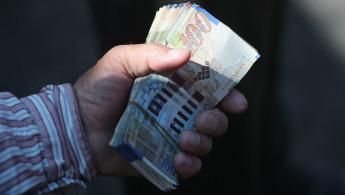Hamas unable to pay Gaza public sector salaries amid growing 'financial difficulties'
The Ministry of Finance in the besieged Gaza Strip said on Saturday that the Hamas-run government is experiencing "a stifling financial crisis," which has led to delays in the salaries of over 40,000 public sector workers.
Awni al-Basha, the ministry's undersecretary, said in an interview with the Hamas-affiliated Al-Aqsa TV that due to the financial deficit increasing every month, the government has reached a point this month where it is "unable to pay its employees."
Increased public spending and a drop in tax revenue have also contributed to the financial difficulties experienced by the government.
The Ministry of Finance in Gaza has not paid any salary to a government employee since May, according to the Turkish Anadolu news agency.
Moreover, Hamas pays salaries to government employees at a rate that does not exceed 60 percent.
Al-Basha stated: "The financial crisis and the blockade imposed on the sector have impacted the employees’ salaries." "The decline in the Qatari grant, the high price of Egyptian fuel, and the lack of grants to ministries are [also] reasons for the government's financial difficulties."
Qatar disburses financial aid on a monthly basis, as part of an agreement concluded in 2018 with the United Nations and Israel, in agreement with Hamas that has governed the Gaza Strip since 2007.
Al-Basha said Hamas is "making significant efforts to pay salaries" and hopes to resolve this issue "by the end of this upcoming week."
He further pointed out that "the government borrows from local banks, but its crises are reflected in the ministry, and that the Ministry of Finance's balance in banks has now reached zero."
The undersecretary did not specify which banks the Gazan government borrowed from.
The Gaza Strip, home to 2.3 million residents, has been under an illegal blockade imposed by Israel since 2007, which has exacerbated poverty levels and restricted access to basic necessities such as education, healthcare and overseas travel, as well as movement to Israel and the occupied West Bank.
The enclave’s economy is largely dependent on foreign aid, notably from Qatar, which pays around $30 million a month in stipends for families and to help pay public sector workers.





 Follow the Middle East's top stories in English at The New Arab on Google News
Follow the Middle East's top stories in English at The New Arab on Google News


